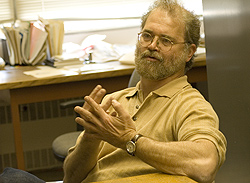Berkeleyan
Postdoc foresees 'equitable learning' for deaf students
Deaf from birth, Marlon Kuntze studies distinctions between many of those who master American Sign Language early in life and those who learn it later. Among them: fluency in written English
![]()
| 19 July 2006
When postdoc Marlon Kuntze was growing up, his "mother tongue" - now known as American Sign Language - was considered by the hearing world as "no more than gestures" or "making pictures in the air," he says. Deaf people, though they knew they had a language, did not conceive of sign as distinct from English. Lacking an official name, Kuntze recalls, "we called it 'sign language' and we thought of it as a different way of saying English - a kind of English on the hands."
 Marlon Kuntze (Deborah Stalford photo) |
Today, Kuntze works full-time on questions related to language, literacy, and deaf education. As a researcher in educational linguistics with a Ph.D. from Stanford, he's spent the past two years at Berkeley studying the acquisition of literacy skills among deaf students - and what that process may reveal in general about second-language learning, literacy development, and learning to write. His appointment is supported by the Chancellor's Postdoctoral Fellowship Program for Academic Diversity.
A bona fide language
Kuntze attributes his own academic success in part to the fact that he is one of the "lucky 10 percent" of deaf people who enjoy early access to sign language and the deaf community - "because I had deaf parents and had been in a signing environment all my life," he says. "Access to language and community means complete access to information and world knowledge and interactions with others."
Another bit of luck was that in the 1970s linguists began to recognize ASL as a bona fide language with a sophisticated grammatical structure, a thriving community of speakers, and rich literary traditions of its own. Serendipitously, Kuntze caught that wave in his 20s by helping to conduct one of the earliest linguistic studies of sign language, at the Salk Institute's Laboratory for Language and Cognitive Studies in La Jolla.
The experience proved to be life-changing. Once he began to appreciate his first language and to see himself as bilingual, he grew intrigued by the fact that a great many deaf children struggle to learn to read and write English, while others like himself - who have never heard English spoken - tend to have fewer problems in this arena. "My curiosity stayed with me," he recalls. "How come deaf children who have full access to American Sign Language early in life often become fluent in written English? And how is it that those who struggle to read and write English are often those who were introduced to sign language late in life?"
Kuntze's subsequent experiences as a K-12 and college teacher, and as a parent of two hearing boys who learned sign even before they learned English, fed his curiosity about language acquisition, literacy (understood broadly to include cognitive skills called into play in language use), and the ways that the educational system and society are failing deaf students. He toyed with studying for a Ph.D. but shelved the idea more than once, thinking "the world was not ready for deaf doctoral students." (Indeed, he was admitted to a graduate program at UC Santa Cruz in the late '70s, but was unable to attend because support for interpretive services was nonexistent at the time.) With the enactment of the Americans with Disabilities Act of 1990, universities began to open their doors to the deaf community and to provide interpretation services. Kuntze seized the moment. More than two decades after completing his undergraduate degree, he enrolled in school again to earn his doctorate.
Deconstructing 'the healthy classroom'
At Berkeley, Kuntze has been observing deaf students in the classroom - at his alma mater, the California School for the Deaf (now located in Fremont) - exploring what it means to learn a second language and what kind of language experiences play a pivotal role in helping deaf children develop literacy skills in English. He's chosen to study a healthy classroom, "where you have a teacher and children who are fluent in ASL." With a model of a well-functioning classroom in place, the task of examining failing and dysfunctional classrooms will be meaningful," he says.
"The ideal way for deaf people to approach the task of learning to read has to be very different from that for hearing children," Kuntze observes. For the latter, who have heard spoken English, "it's often a matter of making a connection between the words they have in that little audio tape in their head and the words before them in print. Deaf children have never heard these words spoken, so obviously the approach has to be different."
That distinction is "exciting and fascinating," he says. "For deaf children, learning English occurs through learning to read; for hearing children, learning to read occurs through having known English. "The "challenge ahead," he believes, is to develop optimal pedagogical practices for deaf students, with that distinction in mind.
"Many deaf students are still being poorly served," Kuntze says. "There is a lot of work ahead to show why society is failing to make learning equitable for deaf students and to help to start making things right in their lives."
He hopes to serve as a "beacon of hope" to other deaf people, who today are still largely excluded from academic careers, by securing an academic position at a research university. "A deaf person obtaining a faculty position," Kuntze says, "would help the deaf community realize that the world of academia, universities, is now accessible - because someone would be inside to serve as a mentor and lay out the welcome mat."
Information on the Chancellor's Postdoctoral Fellowship Program for Academic Diversity is available from the Faculty Equity Office, fea_info@berkeley.edu or 642-1935.

